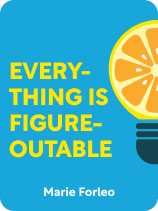

This article is an excerpt from the Shortform book guide to "Everything Is Figureoutable" by Marie Forleo. Shortform has the world's best summaries and analyses of books you should be reading.
Like this article? Sign up for a free trial here.
Do you have a fear of not being good enough? How can you conquer this insecurity?
In Everything Is Figureoutable, Marie Forleo contends that there are many fears that hold people back from pursuing their goals. However, one is particularly effective and controlling: the fear of not being good enough.
Let’s look at how to defeat the insecurities that get the better of you.
How to Conquer a Fear of Not Being Good Enough
According to Forleo, a common fear that prevents people from pursuing their goals is the fear of not being good enough. Many people never act on their dreams because they’re terrified that they’re not capable of achieving them. This fear manifests itself in two ways. First, you might worry that you’re not ready and try to prepare for rather than pursue your goals. Second, you might not pursue your goals because you want to ensure that everything is perfect.
| How Not Pursuing Your Goals Might Lower Your Self-Esteem Although Forleo focuses on how a fear of not being good enough prevents you from pursuing your goals, The Six Pillars of Self-Esteem author Nathaniel Branden warns that this fear may lower your general self-esteem. Branden contends that a belief in your own general capability to deal with life’s challenges is an essential element of self-esteem. Moreover, he asserts that if you act as if you’re capable, you improve your self-esteem; if you act as if you’re not capable, you lower your self-esteem. So if you continuously prepare for (rather than pursue) your goals or don’t act because everything’s not perfect yet, you’ll be acting as if you’re not capable of doing the work necessary to achieve your goals, which will lower your self-esteem—and may make you even less likely to pursue those goals. |
To combat a fear of not being ready, Forleo suggests two strategies. First, if you’re paralyzed by self-doubt, ask yourself: Will I be upset in 10 years if I don’t go for this now? Imagining your potential future sorrow can motivate you to act today. Second, put something you value at risk—like your finances or your reputation. Humans experience “loss aversion,” which means we’re affected more strongly by loss than by gain, and thus we prioritize not losing things over gaining things. So, for example, telling someone you’ll give them $100 if you don’t work on your goal is more motivating than learning that someone will give you $100 if you do work on it.
| How We Prioritize Our Present Selves According to The Willpower Instinct author Kelly McGonigal, putting something you value at risk may be more motivating than imagining your future self. McGonigal explains that we struggle to work in the best interests of our future self because our future self’s feelings and emotions aren’t as real or as present as what we’re feeling right now. So, for example, even if you know that 10-years-in-the-future-you will love that you went to the gym daily, you’re still more likely to spend your gym day on the couch because that’s more immediately rewarding. Our tendency to prioritize our present selves may also explain why we experience “loss aversion,” a term coined by the authors of Thinking, Fast and Slow. Loss aversion is an evolutionary trait passed on from early humanity, when losing something—like weapons or food—was often fatal. So while prioritizing not losing something (like $100 if you don’t reach your goal) may seem like you’re prioritizing your future self, it may actually be a way you prioritize your present self because your brain sees not losing $100 as essential for survival. |
To combat your perfectionism, Forleo suggests that you change your mindset and prioritize improving at your skills rather than doing them perfectly. In other words, you must be willing to fail and to recognize that sometimes, things that feel like failures might actually have a positive impact. This is particularly important if you’re starting out in a creative field, as you’ll likely have an excellent vision that you’re not able to bring to life because you’re not yet skilled enough. However, the only way you’ll improve these skills is by repeatedly practicing them—which necessitates that you continue to create things, even though they don’t meet your high standards.
(Shortform note: In Steal Like an Artist, Austin Kleon says that if you’re an artist, prioritizing improvement rather than perfection can help you. Kleon explains that the only way to become an artist is to create art. So you must be willing to do the work and start creating. To do so, start by copying the work of your creative heroes. You’ll definitely “fail” at doing so because your work won’t measure up to theirs. However, these seeming failures actually have a positive impact: The ways that your copies differ from the original are what make you unique as an artist—so leaning into them will help you discover your creative voice.)
To illustrate the power of pursuing your goals and being willing to fail, Forleo describes the trajectory of her dance career. Initially, Forleo thought that to be a serious dancer, she had to try to go on tour with famous artists, so she auditioned for a music video. Forleo failed this audition.
However, Forleo now views this seeming failure as a blessing in disguise because it forced her to rethink what she really wanted to do with her dance career. Despite her lack of experience, she pivoted to teaching dance classes—a journey that ultimately led her to audition for MTV despite her fears that she wasn’t prepared. Forleo passed this audition, and her MTV career gave her the broadcast experience she would eventually parlay into her successful YouTube show, MarieTV.
(Shortform note: If you genuinely fear you’re not good enough, you may not find Forleo’s story motivating. After all, with the exception of the audition she bombed at, all the experiences Forleo describes are ones in which she succeeded despite her fear of failing. But what if you’re actually not good enough? It may help to remember that nobody is good enough at first: Researchers have found that both successful and unsuccessful people experience failure. So it’s not whether you fail that predicts success; rather, what matters is how you respond to failure. Successful people learn efficiently from their failures and try again quickly—the longer you wait to try again, the less likely you’ll be to achieve success.)

———End of Preview———
Like what you just read? Read the rest of the world's best book summary and analysis of Marie Forleo's "Everything Is Figureoutable" at Shortform.
Here's what you'll find in our full Everything Is Figureoutable summary:
- How to apply the "everything is figureoutable" philosophy to your life
- How you can achieve your dreams and overcome all obstacles
- How to respond when you encounter criticism






